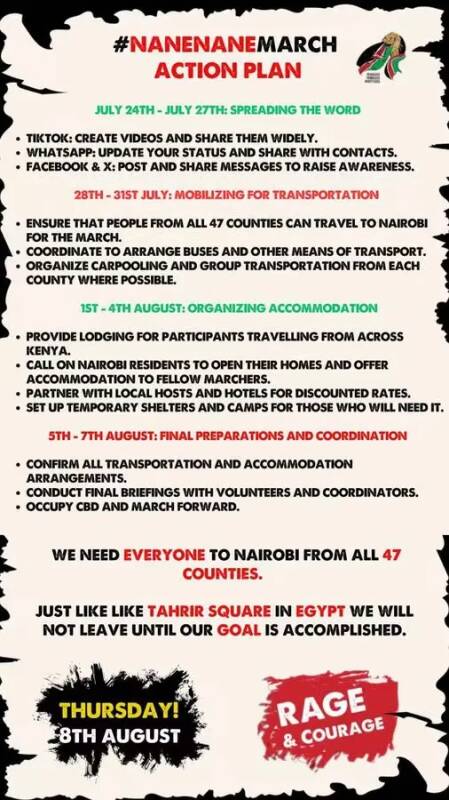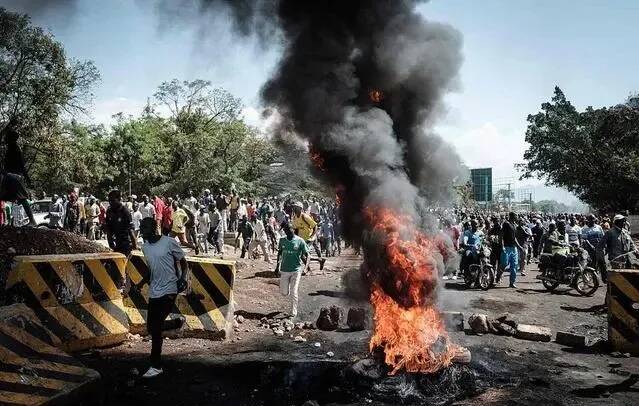Kenyan government deletes fiscal case clause! However, the demonstrations were still unable to quell
On July 25, local time, the Kenyan parliament voted to delete all 65 provisions of the 2024 fiscal bill, local media reported. Congressman Meng shared President Ruto's reservations about the bill and unanimously voted to delete all provisions, but still failed to quell Kenyan anger, followed by demonstrations in August.

It is understood that the Kenyan National Assembly voted on June 25 to pass a fiscal bill explicitly raising additional taxes to raise funds to continue to repay interest on high sovereign debt. The new tax increase will impose a 16% VAT on the purchase of bread, sugar transportation, the use of mobile communications and financial services, and foreign currency transactions.
But for the public, has been facing the pressure of life, that the government inaction, coupled with the tax increase incident, the capital Nairobi the same day anti-tax demonstrations broke out, protesters stormed the parliament building and clashed with the police. It is reported that it was originally a peaceful demonstration, but with the intervention of the Kenyan police, it gradually turned into violence.

After that, the government of Kenyan President Ruto chose a series of measures to quell the incident, first saying that it would not sign the fiscal bill and announcing that all serving cabinet ministers (CS) and the Attorney General (AG) had been dismissed except the Chief Minister and Minister for Foreign Affairs.
In addition, Ruto's government also nominated four important members of the opposition Orange Democratic Movement (ODM) to the new cabinet, but according to Ruto's current nomination of 20 new cabinet members, about half of them were previously dissolved cabinet members, which further aroused the anger of the protesters.
As a result, protests and demonstrations have expanded during the month, ranging from opposition to value-added tax to a number of political demands, including the ouster of President Ruto, opposition to violent police crackdowns, and demands for comprehensive reforms to address corruption. And demonstrations were held not only in the capital Nairobi (Nairobi), but also in Mombasa (Mombasa), Nakuru (Nakuru), Kericho (Kericho), Kisii (Kisii) and Meru (Meru).
Moreover, due to the high unemployment rate in Kenya, many young Kenyans cannot find a job and have no employment prospects, so they have joined the demonstrations and become the main body of the protest.
In the recent protest on July 24, it was Kenyan journalists who held a nationwide protest, condemning police violence against media personnel covering anti-government demonstrations, resulting in dozens of journalists injured in the operation. And on July 26th, Kenya's transport sector also chose to strike and march because of illegal road maintenance fees.
So far, the protests have led to damage to several industries in Kenya, especially the country's important tourism and coffee industries. According to earlier reports, July is the viewing period for the great migration of animals, and it is also the peak tourist season in Kenya, but due to the outbreak of protests and demonstrations in many parts of Kenya, some lawbreakers took the opportunity to block and rob tourists, especially foreign tourists, even in the presence of the police. As a result, the Chinese Embassy in Kenya has also issued a notice reminding people to pay attention to tourism safety.
In addition, Kenya is one of the major coffee producing countries in Africa, attracting many coffee lovers and coffee traders, but there have also been demonstrations and conflicts in some coffee producing areas, resulting in reduced security risks and reduced travel, affecting the development and international influence of Kenyan coffee.
As for the coffee industry, an earlier reform of the coffee industry by the Kenyan government caused several coffee processing plants in Kenya to stop operating without permits (including the world-renowned NKG company) and laid off most of their employees, resulting in a large number of job losses. Due to the current outbreak of demonstrations in many places, many employees went to participate in the demonstrations, and some small factories experienced goods accumulation, manpower shortage, logistics challenges, and so on, resulting in a reduction in export volume and income at the same time. The development prospect of the coffee industry is uncertain.
Important Notice :
前街咖啡 FrontStreet Coffee has moved to new addredd:
FrontStreet Coffee Address: 315,Donghua East Road,GuangZhou
Tel:020 38364473
- Prev

Introduction to Chimier Estate, a coffee producing area in Papua New Guinea, Oceania
Oceania is located in the equatorial northern and southern seas in the central and southern Pacific Ocean. It is the smallest continent in the world. It mainly consists of an Australia continent and more than 10,000 islands scattered in the sea. In addition, Oceania spans three major plates: the Indo-Australian plate, the Pacific plate and the Eurasian plate, and has many islands, and these islands are formed.
- Next

Internal disclosure! Ruixing employees want to open milk tea?!
▲ Click to pay attention| Daily Boutique Coffee Culture Magazine Coffee Workshop Recently, a netizen ordered a lucky drink and was shocked by the scene on the bar when he entered the door to pick up the meal. The clerk who was counting the inventory placed more than a dozen bottles of concentrated juice on the counter. The long row looked colorful, making people mistake for thinking that it was filled with a certain bottle.
Related
- What grade does Jamaica Blue Mountain No. 1 coffee belong to and how to drink it better? What is the highest grade of Blue Mountain coffee for coffee aristocrats?
- What are the flavor characteristics of the world-famous coffee Blue Mountain No. 1 Golden Mantelin? What are the characteristics of deep-roasted bitter coffee?
- Can I make coffee a second time in an Italian hand-brewed mocha pot? Why can't coffee be brewed several times like tea leaves?
- Hand-brewed coffee flows with a knife and a tornado. How to brew it? What is the proportion of grinding water and water temperature divided into?
- What is the difference between Indonesian Sumatra Mantinin coffee and gold Mantinin? How to distinguish between real and fake golden Mantelin coffee?
- What does bypass mean in coffee? Why can hand-brewed coffee and water make it better?
- Unexpected! Ruixing Telunsu lattes use a smoothie machine to foam milk?!
- % Arabia's first store in Henan opens into the village?! Netizen: Thought it was P's
- Does an authentic standard mocha coffee recipe use chocolate sauce or powder? Mocha Latte/Dirty Coffee/Salty Mocha Coffee Recipe Share!
- What is the difference between Vietnam egg coffee and Norway egg coffee? Hand-brewed single product coffee filter paper filter cloth filter flat solution!

